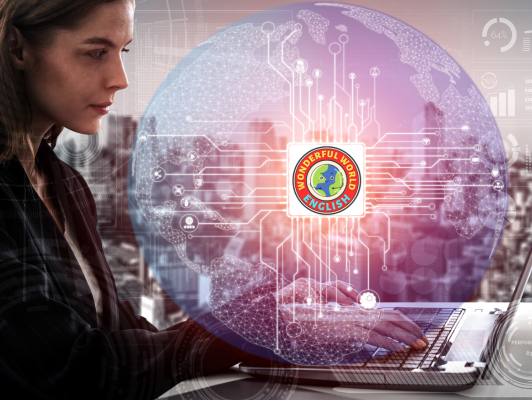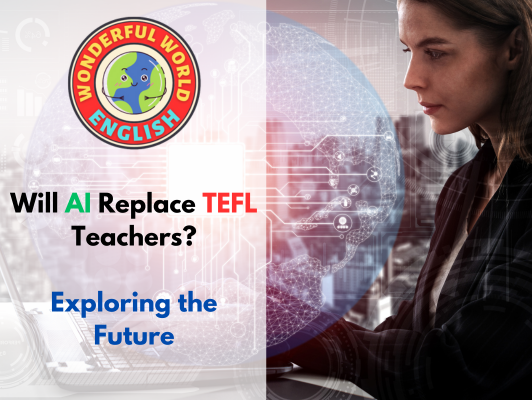Contents
Toggle
Meet David De’ Ath, founder, editor, and writer at Wonderful World English. With his extensive background as an English teacher, David provides valuable insights and practical tips on ESL for students and teachers alike.
The question of whether artificial intelligence will replace TEFL (Teaching English as a Foreign Language) teachers has garnered much attention with the rapid advancement of AI in educational contexts.
The integration of AI tools into the classroom has been met with both optimism for the potential enhancements to personalized learning experiences and concern over the future roles of educators.
It is becoming apparent that while AI can assist with administrative tasks, contribute to lesson planning, and offer students additional practice opportunities, its ability to fully replace the nuanced human interaction TEFL teachers provide is highly debated.
Understanding AI’s impact on TEFL necessitates examining current technology trends within the broader scope of education.
AI’s current application in assisting language learning and providing educational support indicates that it serves more as a complementary asset than a replacement.
Teachers bring an irreplaceable level of empathy, cultural understanding, and adaptive teaching strategies that respond to the unique dynamics of each classroom.
These human attributes are essential for effective language instruction and cannot be replicated by AI.
Key Takeaways
- AI is emerging as an assistive tool, enhancing certain aspects of TEFL.
- TEFL teachers continue to provide elements critical to language learning that AI cannot.
- The interaction between AI and human educators is shaping the future of TEFL.
Impact of AI on TEFL and Education
Exploring the influence of AI on TEFL reveals a transformative shift in educational methods and roles of educators, balancing the promise of personalized learning with challenges like privacy and bias.
Current State of AI in Education
The integration of AI in education is in a dynamic state of expansion, with systems increasingly employed in classrooms and universities around the world.
AI literacy is growing among educators, who are learning to coexist with technology that augments the learning experience.
From adaptive learning platforms to generative AI, these tools are beginning to reshape how language education is delivered and received.
AI systems are not just experimental tools but have found practical applications in various educational settings.
For instance, in China and Cambridge, applications range from assisting with homework to providing immediate feedback on pronunciation, aiding in developing a more efficient and supportive environment for language learners.
Related: AI and the Future of English Language Learning: Insights
Challenges and Limitations of AI
Despite its potential, AI in education comes with challenges and limitations.
There are concerns over privacy, data protection, and the ethical use of student data.
Bias within AI systems can perpetuate inequalities, and there is an ongoing struggle against the spread of misinformation.
The ability of AI to readily adapt to new challenges such as language nuances and cultural contexts is also under scrutiny.
Personalized learning experiences offered by AI must continually evolve to ensure the quality and performance of educational outcomes without compromising creativity or critical thinking skills.
Benefits of AI for Teaching and Learning
Nevertheless, AI presents a wide array of benefits for teaching and learning.
By leveraging AI, educators can tailor the educational content to match each student’s individual needs, leading to more effective learning experiences and improved learner outcomes.
AI tools can enhance performance by automating administrative tasks, giving teachers more time to focus on creative and interactive teaching methods.
They also provide rich data that can inform teaching strategies and contribute to the ongoing development of quality TEFL methodologies.
The adaptability of AI to student needs fosters a more inclusive and supportive learning environment.
Check out the link below for our guide on the best current AI-powered English learning tools!
Related: Best AI-Powered Tools for Learning English (Top 5)

Human Element in TEFL
In the field of TEFL, the human teacher plays an irreplaceable role in facilitating language acquisition and fostering emotional intelligence and critical thinking skills through personal interaction.
Importance of Human Interaction
Human interaction is fundamental to TEFL, where educators are not merely conveyors of linguistic rules but catalysts for cultural exchange and understanding.
Students greatly benefit from the empathy and adaptability of human teachers who can tailor lessons to the class’s dynamic needs and respond to the subtleties of emotional cues.
As discussed on LinkedIn, while AI can disseminate information, the human touch is what makes education transformative.
Developing Core Skills in Students
Teachers are instrumental in developing core skills such as critical thinking, collaboration, and literacy.
These are cultivated not just through structured curriculum, but through the nuanced and responsive interactions between teachers and students.
The adaptability of human educators in addressing diverse learning styles promotes more inclusive and equitable education.
Learning is not a one-size-fits-all process, and the diversity and complexity of humans necessitate a human educator’s presence for optimal educational outcomes.
Related: ChatGPT & English Learning: A Teacher’s Guide
Ethical Considerations in Education
Ethical considerations pervade TEFL, from issues of equity in the classroom to managing potential cheating.
The sense of ethics in human teachers upholds the integrity of the education system.
An open letter further highlights that AI lacks the capability to respond to ethical dilemmas in the manner a human teacher can, a crucial aspect of shaping the moral framework within which students operate.
Teachers instill values and serve as role models, an aspect not replicable through AI.
For a complete guide on TEFL certificates and how you can get your hands on one, check out the link below!
Related: How to Get TEFL Certification: Your Step-by-Step Guide

Conclusion
In conclusion, the integration of AI in the TEFL landscape signifies a monumental shift towards enhancing educational methods and tools.
Yet, it falls short of replacing the irreplaceable human element inherent in teaching.
AI’s role is increasingly seen as supplementary, offering valuable assistance in administrative tasks, data analysis, and personalized learning experiences.
However, the core essence of TEFL—fostering cultural understanding, emotional intelligence, and critical thinking—remains deeply rooted in human interaction and intuition.
TEFL teachers impart language skills and serve as cultural bridges and ethical guides, roles that AI cannot fulfill.
As we venture further into this digital age, the synergy between human educators and AI will undoubtedly shape a dynamic and effective future for language education.
Still, the heart and soul of teaching will invariably reside in the compassion, creativity, and adaptability that only human educators can offer.
We hope you find value in this information.
Have a wonderful day!
Image Attribution: All images licensed via canva.com





